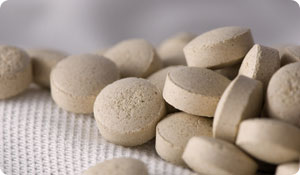
Although the shelves of your local pharmacy or health food store may be lined with dietary supplements claiming to provide a heart health benefit, there is little scientific evidence to support those claims.
To the contrary, one recent large, placebo-controlled randomized study of vitamin E actually failed to show any benefit on heart disease. And an analysis of several randomized trials of vitamin E by the Cleveland Clinic found, "a lack of any beneficial effect... regardless of the doses of the vitamins used and the diversity of the patient populations" and concluded that its study, "did not support the routine use of vitamin E."
In a similar analysis of vitamin A (beta carotene), the Cleveland Clinic researchers found that the use of beta carotene supplements "led to a small but statistically significant increase in all-cause mortality and a slight increase in cardiovascular death."
Because dietary supplements, which include vitamins, minerals, hers and botanicals, aren't regulated and approved by the U.S. Food and Drug Administration (FDA) for safety and effectiveness, there's no way to even be certain about the contents of dietary supplements other than what the manufacturer lists on the label.
As a result of the mounting evidence against supplemental use to boost heart health, the American Heart Association does not recommend using vitamin, mineral, or herbal supplements to treat or prevent heart disease and stroke, with the one possible exception of omega-3 fatty acid supplements, with approval from your doctor. Instead the AHA suggests that you receive all the heart healthy nutrients you need by eating a diverse diet.
Research has shown that following a traditional Mediterranean diet plan reduces the risk of heart disease, as well as incidences of cancer, Parkinson's, and Alzheimer's diseases.
The key components of the Mediterranean diet include:
- Eating primarily plant-based foods, such as fruits and vegetables, whole grains, legumes, and nuts
- Replacing butter with healthy fats such as olive and canola oil
- Using herbs and spices instead of salt to flavor foods
- Limiting red meat to no more than a few times a month
- Eating fish and poultry at least twice a week
- Getting plenty of exercise
- Drinking red wine in moderation (optional)
Before starting any new diet, be sure to check with your doctor to make sure that the plan is right for you.
Sources:
American Heart Association. "Dietary Supplements, Powders and Other Formulas."
http://americanheart.org/presenter.jhtml?identifier=4522
American Heart Association. "Vitamin and Mineral Supplements."
http://americanheart.org/print_presenter.jhtml?identifier=4788
Mayo Clinic. Nutrition and Healthy Eating. "Mediterranean diet: Choose this heart-healthy diet option."
http://www.mayoclinic.com/health/mediterranean-diet/CL00011
Cleveland Clinic. Heart and Vascular Health & Prevention.
http://my.clevelandclinic.org/heart/disorders/cad/vitamin_e.aspx





